Key Findings




Introduction
A key factor impacting New Hampshire’s demographic and economic success is retaining and growing its population. The state has one of the most mobile populations in the United States. In an average year, 56,000 people move to New Hampshire and nearly 46,000 residents leave the state. What motivates people to move to New Hampshire is important to the state’s future and garners considerable policy attention. Much less consideration is given to retaining current residents. Yet on average, nearly 1.3 million New Hampshire residents do not migrate into or out of the state in a given year. Understanding why those residents stay in New Hampshire can be an important element of the state’s comprehensive development strategy.
Many New Hampshire residents are not natives of the state—only 44 percent of the state’s population, and 33 percent of those 25 and older, were born in the state. Thus, the majority of the state’s residents migrated to the state and decided to stay. Migrants who have lived in New Hampshire for more than 10 years, together with residents born in the state, are the focus of this brief.
Why Do Established Residents Stay in New Hampshire?
We asked a representative sample of over 3,300 established residents to tell us, in their own words, their top three reasons for staying in New Hampshire rather than moving to another state. We analyzed their verbatim responses and grouped them into categories, revealing seven main reasons to stay (Figure 1).
Over half the respondents offered economic reasons, with responses ranging from employment to taxes to housing costs. Many people also mentioned the appeal of physical place, including the natural environment and physical location of New Hampshire. Family, such as being near grown children and parents, was another top reason to stay. Social place, reflecting people’s connection to the community, lifestyle, and social atmosphere, was the fourth main reason to stay. Themes mentioned less frequently included the general appeal of the state (e.g., “I just like the state”), politics, and other reasons (e.g., health and avoiding city life). Here we focus on the top four reasons for staying and on the more nuanced sub-dimensions of each of these reasons.
Figure 1. Established Residents’ Top Reasons to Stay in New Hampshire
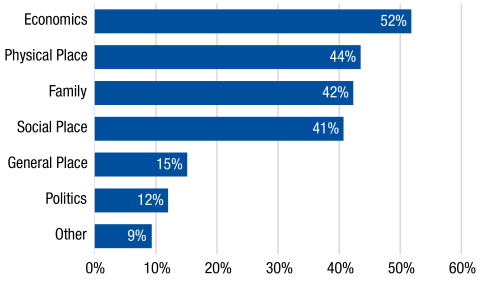
Note: Respondents could provide up to three reasons for staying in New Hampshire, so percentages in this figure exceed 100 percent. Source: NH Granite State Poll, 2010–2012 and 2018–2019.
Connections Across Reasons to Stay in New Hampshire
Almost everyone who stayed in New Hampshire did so for a combination of reasons. In fact, 88 percent of all established residents mentioned more than one reason for staying. For example, while over half of respondents stayed for economic reasons and 44 percent stayed because of the physical appeal of the state, 20 percent of all respondents mentioned both economics and physical place among their reasons to stay (see top left arrow, Figure 2). There are similar patterns of interconnection among all four of the top reasons for staying, underscoring the multidimensional aspect of people’s decisions to stay.
Figure 2. Connections Across the Top Four Reasons to Stay
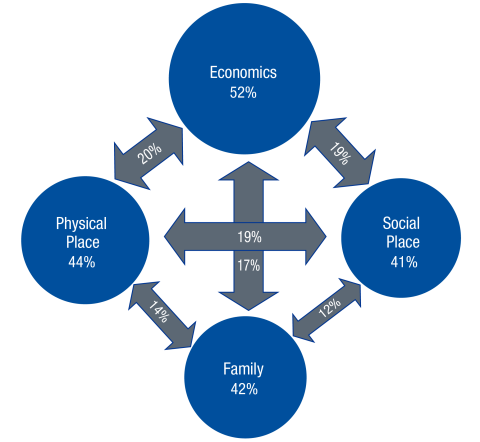
Note: Respondents could provide up to three reasons for staying in New Hampshire, so percentages in this figure exceed 100 percent. Arrows show the share of respondents who selected both of the options indicated. Items in the figure are scaled according to the percent of respondents represented. Source: NH Granite State Poll, 2010–2012 and 2018–2019.
Economic Reasons to Stay
A closer look at the open-ended responses within each of the top four categories reveals the nuanced and interconnected reasons people remained residents of the state. Over half of established residents reported staying due to economic factors, including the state’s general economy and cost of living, employment, taxes, and real estate (Table 1). These economic advantages of living in New Hampshire enhance residents’ ability to earn, save, and spend.
Table 1. Examples of Economic Reasons to Stay
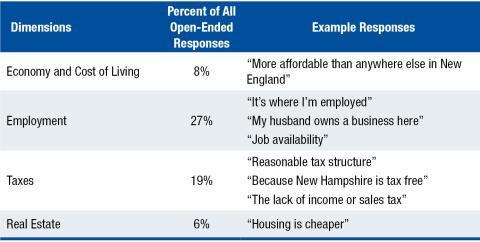
Note: Some people provided more than one economic reason for staying, so the percentages vary from the total for the category. Source: NH Granite State Poll, 2010–2012 and 2018–2019.
Economic subthemes included staying due to one’s own or one’s spouse’s employment, the lack of income and sales tax, and the affordability of housing and property. Many of these reasons intertwine, enhancing residents’ ability to build wealth. For example, saving money through the tax structure and the low cost of living are beneficial for people interested in purchasing real estate. As one resident noted, “my job is here,” there is “no sales tax or income tax,” and “we own our home and have no mortgage.” Residents who listed economic dimensions as their first, second, and third reason for staying often provided a succinct list of reasons, such as “less tax burden [...] real estate […] cheaper in general” and “cost of living […] state tax […] employment.” People who wanted to build wealth appreciated the combination of secure employment, affordable real estate, lower costs of living, and lower taxes, including the lack of an income tax and a sales tax.
Physical Place Reasons to Stay
Residents also reported staying because of New Hampshire’s physical appeal, describing the benefits of the state’s natural environment and its geographic location (Table 2). Together, the natural environment and the physical location tied nearly half of all established residents to the state.
There are several subdimensions of the natural environment, including natural amenities, access to the ocean and mountains, outdoor recreation, the state’s natural beauty, and the seasons. Geographic location encompasses proximity to large cities and access to bordering states within New England. When describing why they stay in New Hampshire, many established residents mentioned both the natural environment and geographic location. Residents noted how a short drive gives them access to a variety of natural amenities as well as proximate large cities, illustrating how the natural environment and the geographic location coalesce to help retain residents. Responses like “access to mountains, beach, city,” “driving distance of White Mountains, and ocean or lake, Boston,” and “easy access to Boston as well as oceans, lakes, and mountains” portrayed the interconnected advantages of New Hampshire’s location.
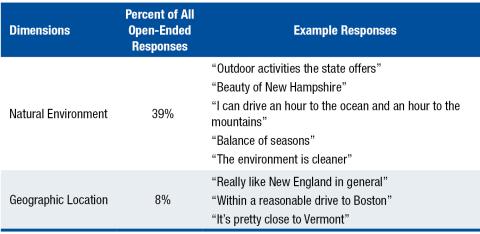
Note: Some people provided more than one physical place reason for staying, so the percentages vary from the total for the category. Source: NH Granite State Poll, 2010–2012 and 2018–2019.
These benefits are rooted in the state’s physical geography and natural environment. Given that nearly half of all residents stayed for reasons associated with physical place, it is critical that development efforts recognize the importance of maintaining and enhancing the state’s physical appeal, both as an outdoor recreation space and an attractive commuter location.
Family Reasons to Stay
Family also motivated many established residents to stay in New Hampshire. However, family can mean different things to different people as reflected in our family subdimensions including general family, to be near family, and household family (Table 3).
While many respondents simply wrote “family” as their reason to stay, others provided more details including living near grown children, grandchildren, parents, or their spouse’s family. People also stayed because it benefited their immediate family, such as their spouse and children. Family reasons for staying varied across the life cycle, reflecting concerns about both immediate household family and extended family living nearby. As one respondent described,“I have family in New Hampshire: seven grandchildren and three daughters. Even though we visit other states, I would never be able to get my wife out of New Hampshire.” Although specific family-related reasons varied, many residents were eager to remain in New Hampshire because it facilitated relationships with their family.
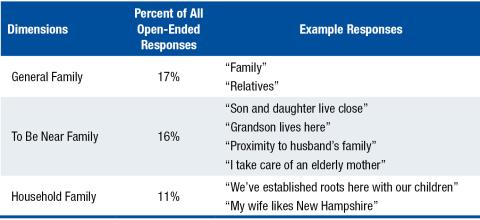
Note: Some people provided more than one family reason for staying, so the percentages vary from the total for the category. Source: NH Granite State Poll, 2010–2012 and 2018–2019.
Social Place Reasons to Stay
Social place was the fourth-most mentioned reason to stay in New Hampshire. It is multidimensional, encompassing six themes: general social place, social connections, being established in New Hampshire, rural and small-town lifestyle, safety, and being a good place to raise children (Table 4). Established residents’ responses illustrated how the social aspects of a place contribute to a person’s quality of life, encouraging residents to stay to enjoy their local neighborhoods, communities, and region.
Social place spanned numerous intertwined themes, but all were tied to the quality of life fostered by residents’ familiarity with the people and communities of New Hampshire. Responses like “It’s nice and quiet, and people get along,” “Feeling safe and more of a community,” and “I like the country living and I like the people” illustrated how different social place themes interact to provide a high-quality lifestyle to residents. The combination of enriching social connections and a location that enhances safety and serenity drew many residents to remain in the state and emphasizes the power of social place to tether residents to communities.
Conclusion
Established residents’ reasons for staying in New Hampshire were multifaceted and interconnected, underscoring the complex decision-making process that underlays people’s decisions about where to live, work, and raise families. Nearly 90 percent of these established residents offered at least two different reasons for staying in New Hampshire.
Table 4. Examples of Social Place Reasons to Stay
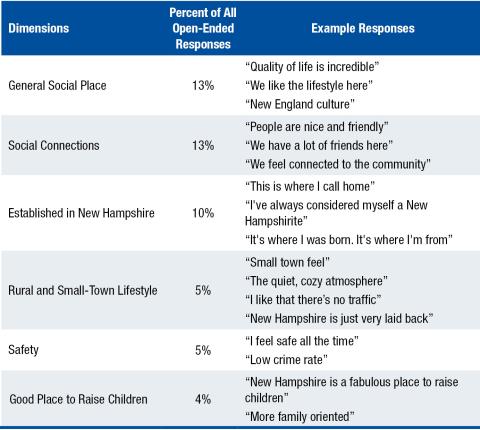
Note: Some people provided more than one social place reason for staying, so the percentages vary from the total for the category. Source: NH Granite State Poll, 2010–2012 and 2018–2019.
Our in-depth analysis of the top reasons to stay—economics, physical place, family, and social place—illustrates the breadth and depth of factors that cause people to stay. Many respondents mentioned the economic benefits of residing in the state, including employment opportunities, low taxes, and modest housing costs compared to nearby states, all of which reduce the cost of living. Residents valued the proximity of large metropolitan areas and the easy access to natural amenities, including mountains, lakes, forests, and the ocean. A host of social and family factors also influenced decisions about staying in New Hampshire. Some remained to be near children, grandchildren, parents, or siblings, while others stayed because New Hampshire is a good place to raise children and provides safe communities. Thus, it was not a single factor, but rather an interconnected set of reasons that encouraged residents to reside in New Hampshire long term. Any one element of this matrix may be more important to one established resident than another. For example, retirees may be less concerned about employment opportunities but place more weight on proximity to family and the natural appeal of the state. In contrast, families with young children may value access to employment, the fact that the state is a good place to raise a family, and the ability to easily visit the mountains or the beach.
Given these findings, simple development strategies based on any one factor, like low taxes or stronger environmental laws, are unlikely to trigger substantial population retention alone. Rather, the multidimensional and interconnected reasons identified here provide a roadmap for crafting programs and policies to maintain and enhance the state’s economic, social, and natural environment, both to retain more current residents and to attract new ones.
Data
Data were collected by the University of New Hampshire Survey Center’s Granite State Poll administered by telephone to New Hampshire residents using random-digit dialing. From 2010–2012 and 2018–2019, 3,372 respondents who were established residents—meaning they had lived in New Hampshire for more than 10 years—were asked their top three reasons for staying in New Hampshire rather than moving to a different state. The questions were open-ended, allowing respondents to offer their answers in their own words, rather than constraining them to a pre-determined list. The data were thematically coded into emergent subdimensions, dimensions, and overarching categories based on why people stayed in New Hampshire. The specificity of the subdimensions created no overlap across the categories. The 9,407 responses fell within seven main categories. There were no substantial differences between responses in the two time periods, so all responses were combined.
1. Kenneth M. Johnson, Dante J. Scala, and Andrew Smith, “First in the Nation: New Hampshire’s Changing Electorate in Changing Times,” Regional Issue Brief No. 60 (Durham, NH: Carsey School of Public Policy, University of New Hampshire, 2019).
This research was supported by the New Hampshire Agricultural Experiment Station in support of Hatch Multi-State Regional Project W-4001 through joint funding of the National Institute of Food and Agriculture, U.S. Department of Agriculture, under award number 1013434, and the state of New Hampshire. The content is solely the responsibility of the authors and does not necessarily represent the official views of the agencies supporting this research.
This research is based on Dr. Bundschuh’s 2022 dissertation, titled “‘It’s Truly Everything’: The Multidimensional and Interconnected Reasons New Hampshire Residents Stay in Place,” completed in the Department of Sociology at the University of New Hampshire.

Kristine Bundschuh is a Senior Institutional Research Analyst at the University of New Hampshire, where she also earned her PhD in Sociology.

Kenneth M. Johnson is Senior Demographer at the Carsey School of Public Policy, Professor of Sociology at the University of New Hampshire, and an Andrew Carnegie fellow.